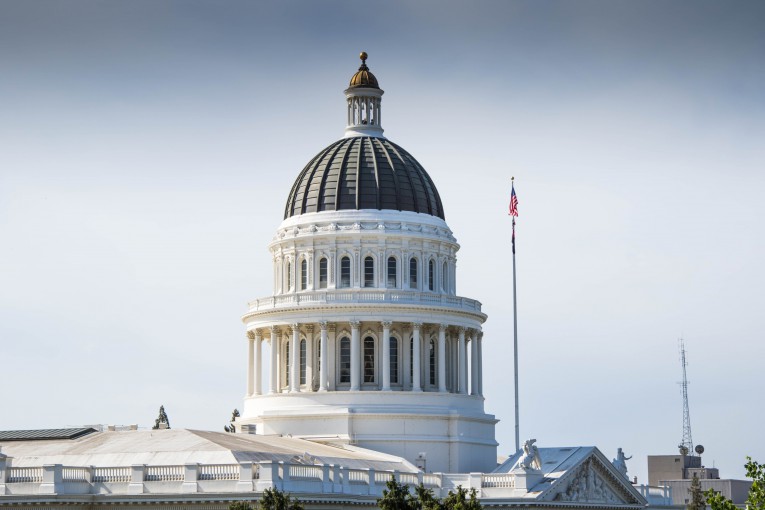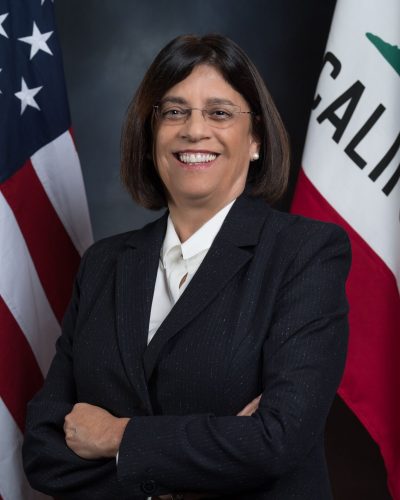
 (From Press Release) – Today, Assemblymember Cecilia Aguiar-Curry (D – Winters) and several of her Assembly colleagues introduced ACA 1, a constitutional amendment which would give local governments improved options for funding critical infrastructure projects, including broadband expansion, local roads, and affordable housing projects. This bill is important, because it will empower local communities to address local priorities without needing to rely on state and federal funding initiatives.
(From Press Release) – Today, Assemblymember Cecilia Aguiar-Curry (D – Winters) and several of her Assembly colleagues introduced ACA 1, a constitutional amendment which would give local governments improved options for funding critical infrastructure projects, including broadband expansion, local roads, and affordable housing projects. This bill is important, because it will empower local communities to address local priorities without needing to rely on state and federal funding initiatives.
ACA 1 would reduce the local vote threshold for approval of bond and special tax measures from a two-thirds vote to a 55 percent majority. This is the same vote threshold that currently applies to all local school district measures. By making this change, ACA 1 puts housing and infrastructure projects on par with school proposals, so that cities, counties, and special districts have a practical financing tool to address community needs.
“As a former Mayor of Winters and board member of regional water, housing, and transportation agencies, I have seen first-hand the deterioration of our once world-class infrastructure,” said Aguiar-Curry. “That is why I introduced ACA 1 on the first day of the legislative session. This proposal will empower California communities to take action at the local level to improve their economies, neighborhoods, and residents’ quality of life. Plus, with discussions underway in Washington D.C. about a federal infrastructure initiative, ACA 1 will give California’s local governments another tool to provide matching-dollars for federal grants to fully take advantage of new funding streams.”
In practice, local officials propose a local bond or special tax, and then the voters in that community decide whether they support the idea or not. The voters would still need to overwhelmingly – with 55 percent of the vote – support a bond or special tax in order for it to be approved. Local officials will still control which priorities they recommend to voters, and local voters will  still control how and where their infrastructure bond or tax dollars would be spent.
still control how and where their infrastructure bond or tax dollars would be spent.
“Local communities deserve a fair chance at making sure that their residents can afford to pay the rent or buy a home,” said Assemblymember David Chiu (D-San Francisco), coauthor of ACA 1 and Chair of the Assembly Housing and Community Development Committee. “California’s housing affordability crisis requires real investment across the entire state, and I applaud Assemblymember Aguiar-Curry for helping us get there.”
“Local voices are central to the conversation about what investments are necessary to support local businesses and improve residents’ quality of life,” said Aguiar-Curry. “Our city councilmembers, county supervisors, and special district representatives are elected to advance our cities, counties, towns, and neighborhoods. There’s no greater impact they can have than targeting public investments to where people need them most. It’s time our constitution allowed them greater ability to do that.”
For every dollar spent on infrastructure, there is a return benefit of several dollars back to our economy from the related construction jobs and activities. These critical projects include fixing streets and roads, constructing public safety facilities for police and fire departments, upgrading water and flood control systems, deploying broadband for internet connectivity, and maintaining  parks. Not only do these construction and maintenance efforts improve communities and residents’ quality of life, they also create new local jobs.
parks. Not only do these construction and maintenance efforts improve communities and residents’ quality of life, they also create new local jobs.
“We need a renewed effort at every level of government to support our economy with modern, safe infrastructure. ACA 1 will empower local officials to ask their voters to approve their vision for how and when to invest in these projects,” said Aguiar-Curry. “Local communities know their priorities best. This constitutional amendment will offer an improved tool for local leaders to prioritize projects and determine how to best pay for them.”
Since 2001, over 2,200 local revenue measures have been placed before voters. Nearly 80 percent of all two-thirds supermajority measures garnered more than 55 percent “yes” votes, but ultimately failed passage because they fell slightly short of the current two-thirds vote threshold. If this amendment became law, those measures would have passed. Because this measure would change the Constitution, the proposal would need to be placed on the ballot for approval in the next statewide election, should the Legislature pass it.
ACA 1 is coauthored by Assemblymembers Chiu, Eggman, Eduardo Garcia, Gloria, McCarty, Mullin, Santiago, and Ting. The bill will be heard in its first policy committee hearing in early 2019.

Homeowners had better buckle up, they’re coming for your wallet. If you think your parcel taxes are high now you haven’t seen nothing yet.
This is what happens when Democrats run the show with a supermajority. Californians are going to see their already high taxes go much higher.
Just to point out – this is only a proposed constitutional amendment. In order for it to take effect, it requires not only legislative approval but ratification by the voters. Your comment is factually inaccurate.
You comment on Keith’s comment ignores his comment.
This would not even be proposed unless the California Democrats had a supermajority and they knew they could ram it through the legislature. It will make it that much easier for people that would not have to pay (or pay very little) to push new taxes onto homeowners.
It probably gets proposed every year.
“Aguiar-Curry proposes raising taxes” would have been a more accurate headline.
Exactly, and you can see now how David seems to be playing down this attempt at raisng homeowner’s taxes.
Because I’ve seen these things proposed every year and I’ve only seen them succeed once. The reason I published this one is it was our Assemblymember proposing it.
Yes, that was going to be my next question, if it has no chance of passing why did you write an article on it? With the increased Democrat supermajority in California’s legislature this year I’m not so sure that it won’t be passed through.
No, that would not be accurate. This would:
Aguiar-Curry proposes lowering tax vote margin required from 2/3 to 55%.
This would be even more accurate:
Aguiar-Curry proposes making it easier to raise taxes on homeowners.
No, because the proposal wouldn’t just apply to homeowners’ taxes.
Or perhaps, for accuracy: Aguiar-Curry proposes measure that would prevent 1/3 of voters from blocking bond and special tax measures supported by a super-majority, raising the requirement to 45%.
Or more accurately, “Aguiar-Curry proposes increased oppression of the minority”
Note Eric that anyone who wants to contribute money to this if currently free to do so.
Or even better yet,
Aguiar-Curry proposes making it easier for those that don’t have to pay to make others pay more taxes.
Jim and Keith – Longing for the good old days, when only white male property owners were allowed to vote? Perhaps we should apportion votes based on wealth–the richer you are, the more votes you get.
The typical liberal infusion of race into every discussion. It gets very old and boring.
Yawn
Typical refusal of those on the right to recognize or acknowledge the impact of their positions on people of lesser means (e.g., low income, non-property owners shouldn’t have as great a say on taxation or spending priorities).
Typical liberal response to people voting taxes on others that they won’t have to pay themselves.
“lesser means” or government bureaucrats and politicians, whichever are the most important.
Will the day come when homeowner’s local property taxes are actually higher than their state/county property taxes?
Keith: I think I have a solution regarding your concern. Everyone should just move into apartments and Affordable housing.
Problem solved! 🙂
Yes Ron, then they can advocate for more taxation of homeowners that they themselves either don’t have to pay or pay very little.
So many of my well-off friends have left the state taking their businesses with them.
Atlas is shrugging and the looters and moochers are going to be left with an empty shell prone to the four seasons of flood, fires, earthquakes and riots.
Which ones are the “looters”, vs. the “moochers”? And, how would I apply for a position with either one? 🙂
Sorry – I’m in a “jocular” mood, today.
Ron, you should know better than anyone that “jocularity” isn’t allowed on the “V”.
https://en.wikipedia.org/wiki/Atlas_Shrugged
In skimming through this, it looks like we left out “parasites”.
Of the three terms, I’m thinking that “looter” has perhaps the most positive strengths. (Usually young, strong, able to take advantage of opportunities as they arise, etc.)
But then again, “moochers” must at least have some decent people skills, to survive.
“Parasites” are probably the worst.
O.K. – that’s more than enough from me. 🙂
This is great. At 55% the roads and paths parcel tax would have been passed. This would have been a huge financial benefit for libertarians who drive as their cars would sustain less damage from potholes, or it would at least be more comfortable. Further, fewer bike crashes would happen meaning less medical expenses that govt. has to pay and fewer lawsuits against the city – it’s essentially a kind of economic insurance for cities to have as good roads as possible.
Going forward, this lower threshold should make it easier to create a moderate toll on I-80 going over the Yolo Bypass and on CA-113 going through Davis. Low-income persons and certain business persons would get a discount on the toll, as would carpools. The toll on I-80 would help the region raise millions of dollars for sustainable transport (similar to what is done on many MTC-area bridges) and to mitigate the negatives of I-80 going through town. The toll on CA-113 could be used to pay for a cover, shelf, sort of tunnel etc over the highway, allowing this area to be used for a huge amount of housing and commercial developments with both carfree access by bike to UCD campus and bikefree access by car to CA-113 (there would be centralized parking garages that could be used by residents of the Vic Fazio Linear Mixed-Use Project and others who want to avoid paying the higher cost of neighborhood parking permits.)
55. Stay alive.
As in “you didn’t build that”, “not paying your fair share”.
So, at a national level we stopped the shrugging, but in the state of California resistance and TDS, we are committed to it.
California politicians are so addicted to looting that they even do it to their own policies (Redevelopment Agencies) meant to help the less fortunate (those needing low income housing) so that they can hand it to other constituent moochers (the CA teachers union members) that would better shower them, the looters, with praise and a greater hold on looting power.
Looters take from producers with the threat of armed enforcement.
Moochers take from producers with the threat of tears.
I support more non-sequitur postings! (And humor, in general.)